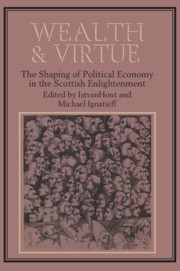Book contents
- Frontmatter
- Contents
- Preface
- List of abbreviations
- 1 Needs and justice in the Wealth of Nations: an introductory essay
- 2 Where had the Scottish economy got to by the third quarter of the eighteenth century?
- 3 Gershom Carmichael and the natural jurisprudence tradition in eighteenth-century Scotland
- 4 The Scottish professoriate and the polite academy, 1720–46
- 5 From applied theology to social analysis: the break between John Locke and the Scottish Enlightenment
- 6 The Scottish Enlightenment at the limits of the civic tradition
- 7 Adam Smith as civic moralist
- 8 The legal needs of a commercial society: the jurisprudence of Lord Kames
- 9 Cambridge paradigms and Scotch philosophers: a study of the relations between the civic humanist and the civil jurisprudential interpretation of eighteenth-century social thought
- 10 Adam Smith's ‘enduring particular result’: a political and cosmopolitan perspective
- 11 The ‘rich country–poor country’ debate in Scottish classical political economy
- 12 John Millar and individualism
- 13 Scottish echoes in eighteenth-century Italy
- Index
9 - Cambridge paradigms and Scotch philosophers: a study of the relations between the civic humanist and the civil jurisprudential interpretation of eighteenth-century social thought
Published online by Cambridge University Press: 05 June 2012
- Frontmatter
- Contents
- Preface
- List of abbreviations
- 1 Needs and justice in the Wealth of Nations: an introductory essay
- 2 Where had the Scottish economy got to by the third quarter of the eighteenth century?
- 3 Gershom Carmichael and the natural jurisprudence tradition in eighteenth-century Scotland
- 4 The Scottish professoriate and the polite academy, 1720–46
- 5 From applied theology to social analysis: the break between John Locke and the Scottish Enlightenment
- 6 The Scottish Enlightenment at the limits of the civic tradition
- 7 Adam Smith as civic moralist
- 8 The legal needs of a commercial society: the jurisprudence of Lord Kames
- 9 Cambridge paradigms and Scotch philosophers: a study of the relations between the civic humanist and the civil jurisprudential interpretation of eighteenth-century social thought
- 10 Adam Smith's ‘enduring particular result’: a political and cosmopolitan perspective
- 11 The ‘rich country–poor country’ debate in Scottish classical political economy
- 12 John Millar and individualism
- 13 Scottish echoes in eighteenth-century Italy
- Index
Summary
This essay is designed to study two approaches to the interpretation of early modern political and social thought, and of Scottish historical and economic theory in particular. The title chosen for the essay suggests that Cambridge is a ground on which both approaches are flourishing, as was clearly demonstrated by the King's College symposium out of which this volume grows; and I shall take the opportunity to comment upon some recent developments in Cambridge study of the history of political and social thought. The essay itself, however, is written at a distance from Cambridge, and reflects some of the current preoccupations of American and Canadian scholarship in the field.
The so-called civic humanist paradigm, with which the author of this essay is associated, makes its starting point a certain early modern articulation of the idea of virtue. In this sense, the term ‘virtue’ referred not simply to morally desirable practices or the inner disposition of the self towards them, but to the practice of citizenship in the classical or Graeco-Roman sense of that term. It entailed the maintenance of a civic equality among those who passed the often severe tests prerequisite to equality, and the moral disposition of the self towards the maintenance of a public (a better adjective than common) good, identifiable with the political association, polis or respublica, itself.
- Type
- Chapter
- Information
- Wealth and VirtueThe Shaping of Political Economy in the Scottish Enlightenment, pp. 235 - 252Publisher: Cambridge University PressPrint publication year: 1983
- 58
- Cited by



